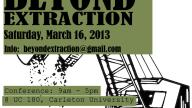This one-day conference on Canada’s current extractivist development strategy took place on March 16 at Carleton University. Co-organized by MiningWatch and Studies in Political Economy, it brought together over 100 participants to asses the extractivist model and propose alternatives that are more just, responsible and sustainable.
Panel presentations were organized around three themes: identifying the problem, resistance, and alternatives to the extractive economy. Our keynote speaker, Art Manuel, spoke about indigenous resistance to the extractive model and the need to reconcile inherent Indigenous rights with any model of development.
Audio files and presentations for some speakers are available below.
We have also created a Beyond Extraction Resources Page for additional information.
Panel 1: Identifying the Problem
- Ramsey Hart, MiningWatch Canada - Presentation (PDF 900 Kb)
- Clayton Thomas-Muller, Indigenous Tar Sands Campaign
- Emilie Cameron, Carleton University
- Warren Bernauer, York University
Audio File (MP3 )
Panel 2: Resistance
- Dave Coles, Communications, Energy and Paperworkers Union
- Paul Slomp, National Farmers Union - Presentation (PDF 600 Kb)
Audio File (MP3)
Key Note Address
- Art Manuel, Indigenous Network on Economy and Trade - Presentation (PDF 2.4 Mb) Audio File (MP3)
Panel 3: Alternatives I
- Jen Moore, MiningWatch (an interview with Alejandra Alyza Moncloa) - Presentation (PDF 82 Kb)
- Bruce Campbell, Canadian Centre for Policy Alternatives
- Peter Andrée, Carleton University and Marie-Josée Massicotte, University of Ottawa - Presentation (PDF 1.4 Mb)
Audio File (MP3)
Panel 4: Alternatives II
- Greg Albo, York University
- Travis Fast, Laval University - Presentation (PDF 300 Kb )
- Bob Lovelace, Ardoch Algonquin First Nation and Queen’s University video presentation (above).
Audio File (MP3)
Thanks to our sponsors
- Communication Energy and Paperworkers Union of Canada
- Canadian Labour Congress
- Canadian Centre for Policy Alternatives
- Canadian Union of Public Employees
- Carleton University Department of Political Science, Institute of Political Economy, Department of Geography and Environmental Studies, and Faculty of Public Affairs
- Université du Québec en Outaouais
